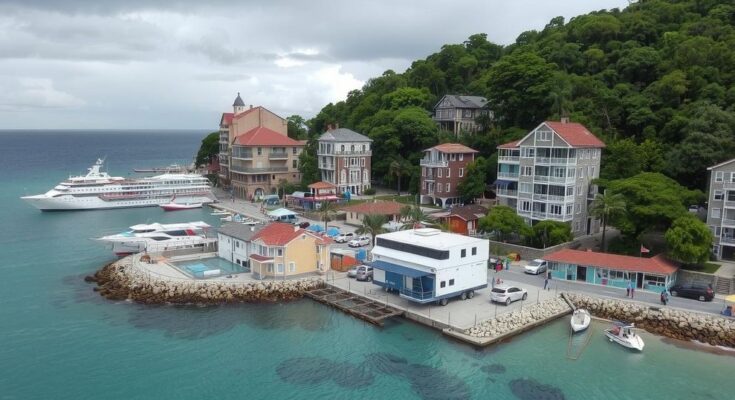France is providing urgent assistance to Mayotte after Cyclone Chido wreaked havoc on the island, leading to fears that the death toll could reach thousands. Rescue personnel and supplies have been dispatched, but significant infrastructure damage complicates recovery efforts.
Following the devastating impact of Cyclone Chido, France has rapidly deployed assistance to its overseas territory of Mayotte, located in the Indian Ocean, which has experienced its most severe storm in nearly a century. The cyclone, which struck on Saturday, is believed to have claimed hundreds or potentially thousands of lives. In response, rescue teams, medical personnel, and numerous supplies have been dispatched from mainland France and the nearby French territory of Reunion. French government officials anticipate the arrival of over 800 additional personnel in the coming days to aid in the recovery efforts amid widespread destruction.
In the aftermath of Cyclone Chido, which left entire neighborhoods in ruins, Mayotte’s Prefect François-Xavier Bieuville noted that the informal housing conditions in the island’s impoverished regions contributed to the extensive damage. Affected infrastructure includes Mayotte’s main airport and hospital, both of which have suffered significant harm, while power outages remain widespread. The cyclone endured winds exceeding 220 kph (136 mph), classifying it as a Category 4 cyclone, indicative of its severity. Due to the cyclone’s harsh effects, official death toll estimates currently stand at 14, though reported figures suggest the number could reach several hundred or more.
Mayotte stands as France’s poorest overseas department and, by extension, is regarded as the most economically disadvantaged territory within the European Union. This economic status has prompted migration from less prosperous regions, such as Comoros and Somalia, seeking improved living conditions and access to the French welfare system. Complicating efforts to tally casualties, social and cultural practices, including swift burials within 24 hours of death, may impede accurate reporting of fatalities. Furthermore, a significant portion of the population consists of undocumented migrants, adding layers of complexity to the situation.
Cyclone Chido’s effects have extended beyond Mayotte, impacting nearby islands in the Indian Ocean, including Comoros and Madagascar, with the cyclone making landfall in Mozambique on the African mainland, potentially affecting over 2 million individuals. Notably, the region is bracing for continued challenges as the cyclone has yet to dissipate entirely, with additional preparations for evacuations underway in Malawi and Zimbabwe due to the risk of flooding. Historical context reveals that the cyclone season from December through March has produced several strong storms in this region of the world, emphasizing the growing vulnerability of these territories.
The article discusses the immediate humanitarian response by France to Cyclone Chido, which has devastated the island of Mayotte. This cyclone has struck the region with unprecedented ferocity, leading to concerns over a staggering death toll as authorities coordinate rescue and relief measures. The socioeconomic background of Mayotte as a French territory and its status as the poorest region in the European Union provides insight into the challenges faced in recovery efforts, including significant infrastructure damage and the complexities related to an undocumented migrant population. The article also connects the cyclone’s impact to wider regional issues in the Indian Ocean, illustrating the historical context of severe storms affecting these territories.
In conclusion, Cyclone Chido has inflicted catastrophic damage upon Mayotte, prompting urgent humanitarian aid from France. The extent of casualties remains uncertain, with initial reports highlighting fatalities that could range from hundreds to potentially thousands. As rescue operations progress, the challenges faced by Mayotte’s impoverished population emphasize the region’s vulnerability to climatic disasters. Continued cooperation and swift action will be essential for effective recovery and restoration of essential services on the island.
Original Source: ny1.com




